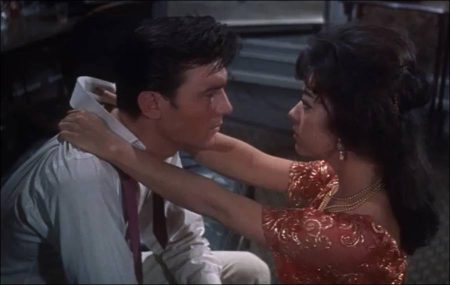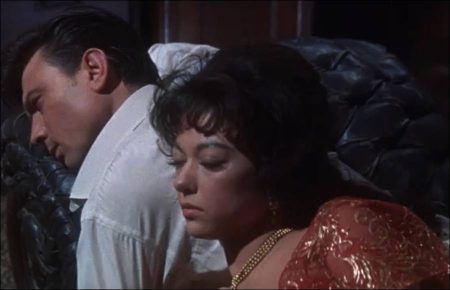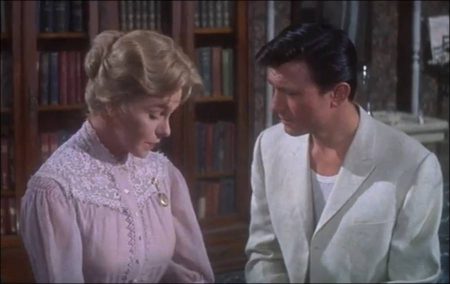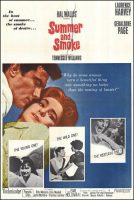Summer and Smoke movie storyline. Uptight single woman Alma Winemiller (Geraldine Page) carries a torch for the boy next door, who has grown up into dashing doctor John Buchanan Jr. (Laurence Harvey). An unabashed hedonist, John falls for the sensual Rosa Zacharias (Rita Moreno) and enjoys carefree nights out on the town, an approach to life that starkly contrasts with Alma’s reserved manner. While Alma attempts to come out of her shell, John also reconsiders his impulsive ways, leading to the possibility of romance.
Summer and Smoke is a 1961 American drama film directed by Peter Glenville, and starring Laurence Harvey and Geraldine Page, with Rita Moreno, Una Merkel, John McIntire, Thomas Gomez, Pamela Tiffin, Malcolm Atterbury, Lee Patrick, and Earl Holliman. Based on the Tennessee Williams play of the same name, it was adapted by James Poe and Meade Roberts. The story follows a young reserved girl who meets a doctor who lives on the wild side. They become friends, but their respective beliefs create difficulties for the relationship.
Film Review for Summer and Smoke
Tennessee Williams play, “Summer and Smoke” was made into a mediocre Hollywood movie thirteen years after it was written. In 1952, Jose Quintero directed a landmark stage production, which became famous for establishing Geraldine Page as a foremost stage actress of her generation.
Set in 1916 in a Mississippi town, the story concerns a frustrated spinster, Alma Winemiller (Geraldine Page), and the consequences of her sexual repression. Interestingly, in 1961, another film revolved around a spinster, played by Deborah Kerr in The Innocents,” based on Henry James’s book The Turn of the Screw.”
Alma nurses an unrequited love for John Buchanan (Laurence Harvey), the virile next-door neighbor. Under the facade of decorum and gentility, she is burning with desire for the pleasure-seeking John. Spent in futile dreams, Alma’s life has been a miss. Caught between a righteous minister-father (Malcolm Atterbury) and insane mother (Una Merkel), she is almost doomed, almost,” because at the end she transforms.
Against the tradition of repressed spinsters, Williams constructed a heroine capable of rebelling against her parents and against society’s mores. Alma adopts a looser morality and, in the last scene, picks up a traveling salesman at the town’s square.
The film, as a whole, is one of the weakest adaptations of a Williams work, stemming from the fact that, as Yacowar pointed out, it is a stylized play of ideas with an expressionistic setting. Two theoretical forces clash in the play: body, or sensualist orientation, embodied by John, and soul (the heroine’s name) or spiritualist orientation. Every character in the movie has its opposite type and embodies an abstract idea. Alma’s father is everything that John is not: the two complement each other.
To open up the play, director Peter Granville resorts to outdoor activities, band concerts, gambling casinos, and cockfights. But the town is never brought to life and the setting remains an external decor for the psychological study.
In the tradition of small-town adolescents, Alma is the only character that has both parents. John has no mother, Nellie, Alma’s student, has no father, and Rosa Gonzales also lacks a mother. But Alma’s mother is psychopathic, given to outbursts of malice. Spiteful and addled, she shocks Alma with her kleptomania. Childish, she reveals sensory delight in ice cream. Mrs. Winemiller is a negative role model, a living proof of what might happen to sexually frustrated housewife, unhappily married to a self-righteous man.
Summer and Smoke (1961)
Directed by: Peter Glenville
Starring: Laurence Harvey, Geraldine Page, Rita Moreno, Una Merkel, John McIntire, Thomas Gomez, Pamela Tiffin, Malcolm Atterbury, Lee Patrick, Max Showalter, Earl Holliman, Pepe Hern
Screenplay by: James Poe, Meade Roberts
Production Design by: Richard Blaydon
Cinematography by: Charles Lang
Film Editing by: Warren Low
Costume Design by: Edith Head
Set Decoration by: Sam Comer, Arthur Krams
Art Direction by: Hal Pereira, Walter H. Tyler
Music by: Elmer Bernstein
MPAA Rating: None.
Distributed by: Paramount Pictures
Release Date: November 16, 1961
Views: 194











